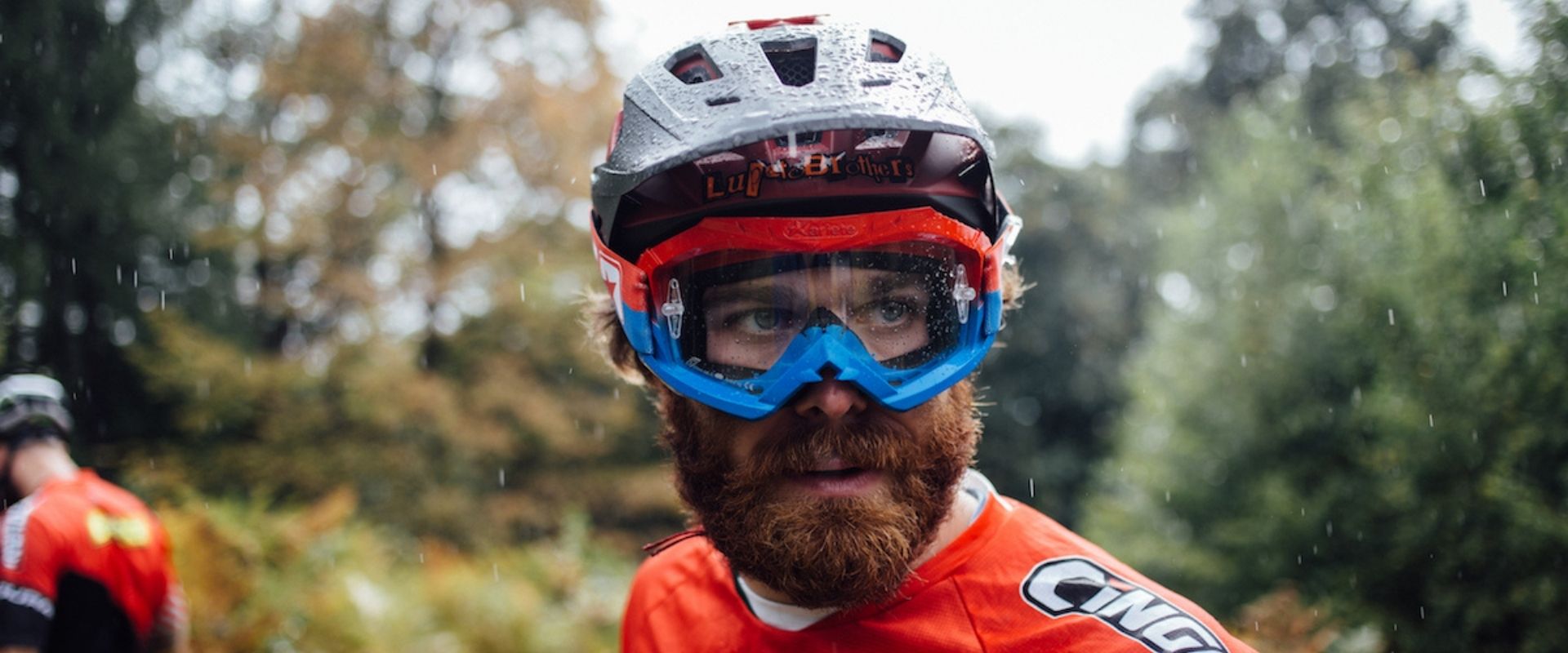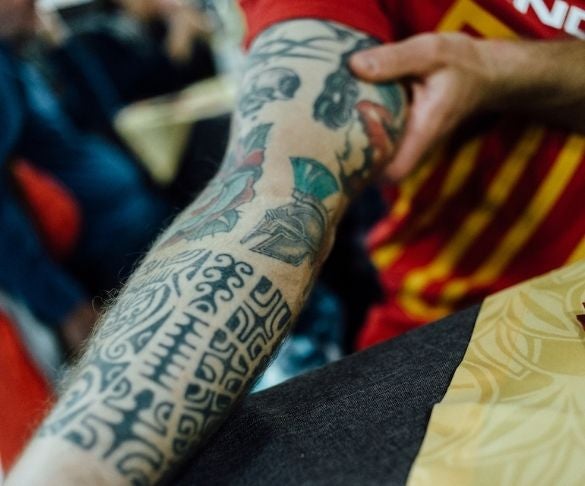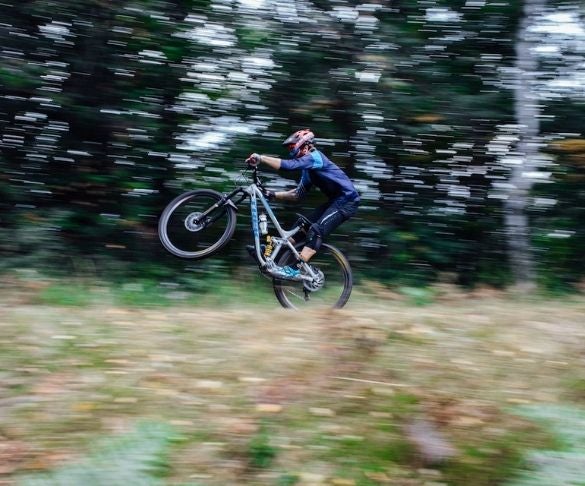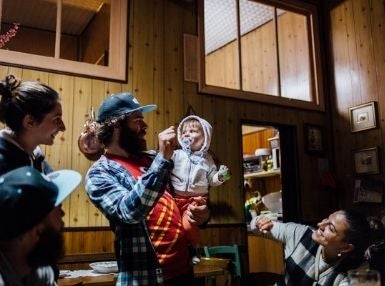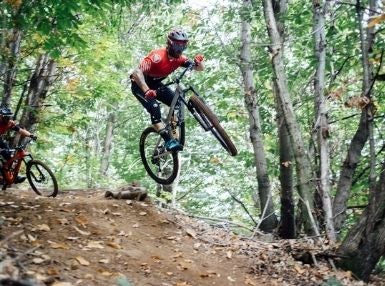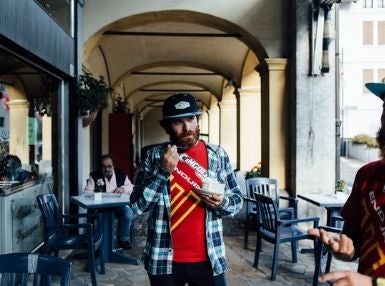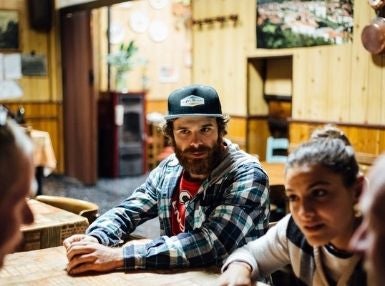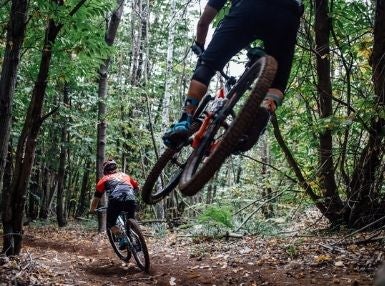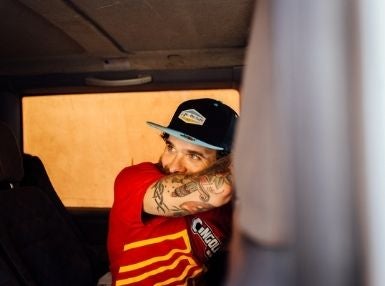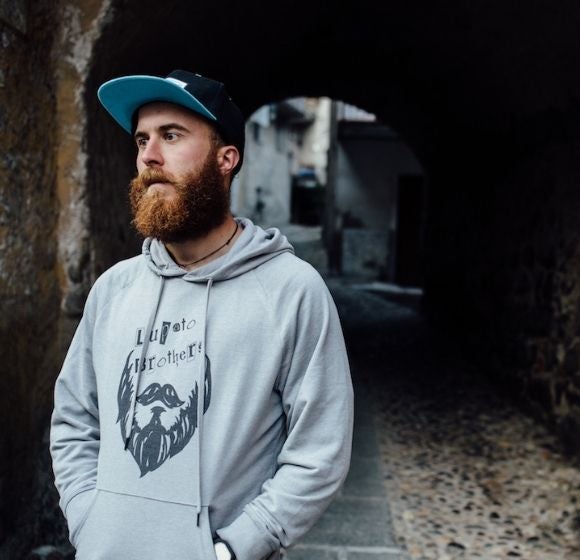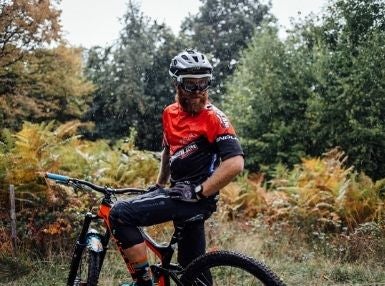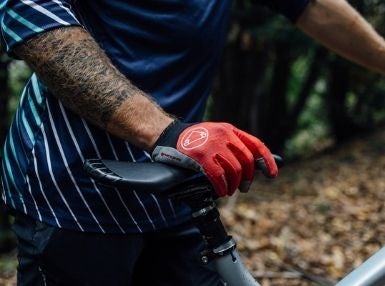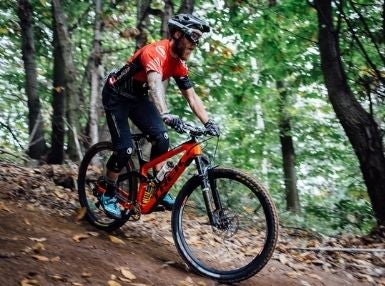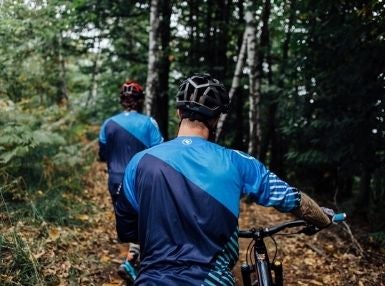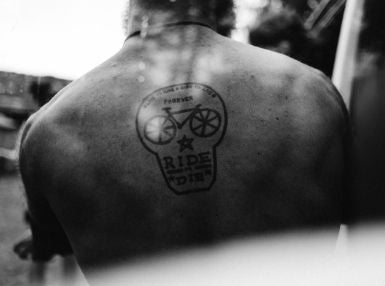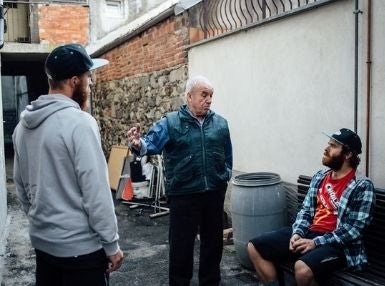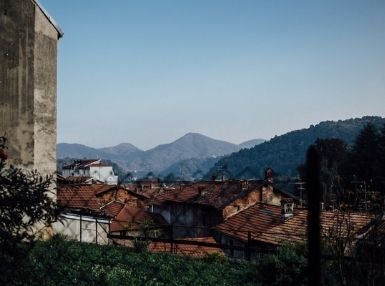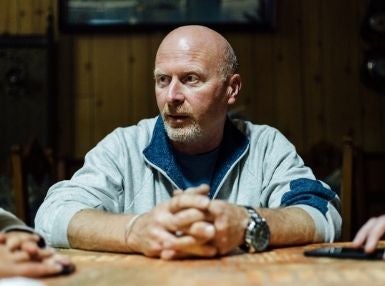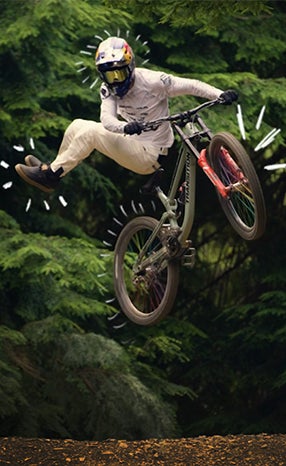A FAMILY AFFAIR
Welcome to Coggiola in Italy’s Piedmont, and to a close knit community that continues to thrive in an increasingly anonymous age. Welcome to a family with mountain biking at its heart, and the trails, trophies and Tricolore jerseys to prove it.
Welcome to twisting descents, off-camber jumps, perfect landings, and pinpoint cornering. Welcome to trails taken in full attack mode. Welcome to beards and beers, tattoos and macchiatos, relentless training and full-bore racing. Welcome to the world of the Lupato brothers.
“The brothers’ exploits have generated a following. When they began, they joined their father, and a handful of others. Now, Coggiola is a place to which people travel to ride.”
Spend time with Alex and Denny Lupato in the tiny commune where they were born and raised (and which neither is inclined to leave), and you will gain a window on an almost magical existence, though one that strikes both as entirely normal.
Theirs is a daily routine of training on the trails their father built, and occasional, mid-afternoon ice cream in the gelateria, where the old men gather in front of the television to watch, on the day of our visit, Nairo Quintana and Movistar Team contest the Tre Valli Varesine; ‘cousins’ of the Lupatos in Endura’s all-embracing clan.
The Lupatos are a family who have lived for four generations at the heart of a community of just over 2,000 people. The pizzeria is decorated with their portraits; photographs of a community’s favourite sons. Denny Lupato’s van, a vehicle that has clocked up more miles than the Starship Enterprise, is greeted by everyone - everyone - in Coggiola with a wave of acknowledgement.
The rock star aesthetic and nerveless descending might have them marked out as identikit enduro racers; on-trend and highly marketable in a brand-conscious age. The reality could scarcely be more different, despite ad campaigns and signature products for some of the industry’s biggest players. They are grafters, albeit gifted, whose relentless schedule of training and racing puts food on the family table, earning the respect of once skeptical neighbours in a village where everyone knows everyone.
VISIBLE INK
The Lupatos talk us through their impressive tattoo collections. It is nearly 10pm, and nearing the end of a day we began 17 hours earlier in London, but they have our full attention. This is serious ink.
The environment could hardly be more convivial – or Italian. Our seminar takes places in a tiny pizzeria, nestled in a network of narrow and softly-lit cobbled streets. Its elderly patron is almost as impressively bearded as his honoured guests. This is a restaurant with a family seated at every table, each conversing with another family, seated at a different table.
“Alex raced in the Barcelona Red Hook, and both he and Denny now ride fixies to hone pedalling technique and to build leg strength. Bicycles - of any sort - are at the centre of their lives.”
Alex has returned from the bathroom, where he glimpsed in the mirror the chain tattoo on the inside of his right bicep, triggering a memory. He chose the chain motif to celebrate winning his first Italian Enduro championship. The centurion’s helmet below was added to honour his second title, won in Rome; an apple, the regional symbol of Trentino, a province famed for its orchards, marks the third.
Denny gained his first tattoo in similar circumstances, by choosing, as a 16-year-old, to commemorate his victory in the junior Italian XC championships in ink. “You start with one, and then it’s hard to stop,” he says, with a rueful grin. The designs etched on his arms and legs, chest and back, bear silent witness to his addiction to ink.
There is a large skull inscribed in the centre of his back, with bicycle wheels for eye sockets and the motto ‘Ride or Die’ for teeth, that may soon be joined by a dragon, though he has yet to decide (he is also keen to include SpongeBob SquarePants). Alex meanwhile is considering an image of Leonardo (the Ninja Turtle, not the artist, and the character for whom his nine-month-old son is named).
We are getting off topic. The Lupato brothers are enduro mountain bikers, not fashion models. There is more to be said about their racing and training, their triumphs and disappointments, and the family’s close association with mountain biking in Italy, than any personal adornments.
THE GELATO INCIDENT
Alex Lupato loads a small, shovel-shaped spoon with gelato and lifts it to his mouth. Midway through its journey, the creamy contents slip from the spoon and hurtle towards the ground. In a single motion, he reaches down, catches the gelato with his spoon and delivers it to its intended destination. “Nice,” he says.
"Denny notes the evolution of enduro courses and a trend that places greater emphasis on pedalling sections; grist to the mill of a former XC champion, perhaps."
Athletes sometimes possess such intuitive understanding of time and space that it can seem like a sixth sense. The gelato incident is just one, small example of Alex’s heightened perception, but even in our short acquaintance (we met for the first time only three hours earlier) is not surprising; we spent the intervening period watching him ride a bike, after all. His innate balance and timing, not to mention his power and precision, were plain to see, as he scythed through woodland on a trail built by his father.
Alex has a habit of punctuating his sentences with a laugh, but he is not a ‘yes’ man. If he disagrees with the import of a question, he will tell you. Occasionally, our interpreter is called upon to clarify any subtleties lost in translation. Having done so, Alex swiftly reverts to English, offering a small window on a determined character.
He is versatile, too. Over the aforementioned gelato, he reveals that this year he took part in the Barcelona round of the Red Hook criterium series. Enduro bikes are one thing; fixies, quite another.
“It’s different, because you need to stay inside the group,” he explains. “If you’ve never raced a road bike before, it’s hard to stay in the group without brakes!”.
His smile confirms that no disaster resulted from the change of code. Both he and Denny now ride fixies to hone pedalling technique and to build leg strength. Bicycles – of any sort – are at the centre of their lives.
ENDURO TO GO
Enduro has quickly become the bicycle industry’s default; its ‘go to’ image of mountain biking. It is the style of racing most similar to the trail riding of the modern mountain biker. It did not take Alex long to establish himself as a force in this new discipline. In his first race, he won his category and finished third overall.
Some of his immediate impact can be attributed to a seven-year career as an XC racer; one begun in 2003 as a junior, and which placed him among the top 10 riders in Italy, but no higher. He was set to turn professional when he left school, but when his mother lost her job, he took work at a local factory.
“The pizzeria is decorated with their portraits; photographs of a community’s favourite sons. Denny’s van is greeted by everyone - everyone - in Coggiola with a wave of acknowledgement.”
One month into his new profession, however, he discovered an enduro race was to be held just 30 minutes from Coggiola. He called a friend at a local shop and asked to borrow a bike.
“On the Friday, I went to the shop to collect the bike and invert the brakes, because I ride [with British routings]. The next day, I tried a full suspension mountain bike for the first time. On the Sunday, I raced and finished third.”
It became immediately apparent that enduro racing offered a platform for Alex to express his riding talent to its fullest extent. He is the first to admit that Denny was the better XC rider. When he started in full-time employment, Alex reduced his riding to an evening spin; something to kill time before bed. Enduro put his riding career back on track.
He was soon offered a professional contract; the first, he says, given to any enduro rider in Italy. His experience, however brief, of being out of the sport and in the workaday world has given him perspective. His schedule of training and racing is exhausting, but it beats working in factory.
(Unemployment is a continual, if minor theme in our conversations in Coggiola. Even if there is a positive atmosphere among the people in the bar and the bakery, the pizzeria and the gelateria, it is clear that the town has known more affluent times. Fila, the sportswear giant, now owned by a South Korean conglomerate, spent most of its 106-year history here and in neighbouring Biella. Both of the sizeable textile factories in Coggiola are now closed.)
WORK, THEN PLAY
The popular image of enduro racing is of laid-back dudes whose success results from little more than playing on their bikes. Conversation with the Lupatos exposes the portrait as false.
Alex describes his training regime as ‘complicated’; more so than during his days as an XC racer. He still works with an endurance coach, recording his efforts in Training Peaks, but to succeed in enduro requires more than a fully developed VO2 max.
“Athletes sometimes possess such intuitive understanding of time and space that it can seem like a sixth sense.‘The gelato incident’ is one, small example of Alex’s heightened perception.”
“You need to be focussed on pedalling, on handling skills, on power, on resistance, and on gym work,” Alex explains, “so, it’s very hard to stay focussed on everything [simultaneously] and not lose what you had before.”
Success is difficult to achieve, but even harder to maintain. Three times, Alex has been enduro champion of Italy, but this year lost his crown by just six seconds. The margins are fine, and the standard rises every season. A punishing programme of ‘cross fit’ style calisthenics is now part of his training regime.
The dominant image of enduro racer as pleasure-seeking freerider may not be entirely accurate, but Alex is also keen to highlight the importance of enjoyment.
“Yes, it’s hard, but it’s also fun, because every day you can ride different bikes,” he says, laughing. “When you go to an XC race, you can’t explore the city, because you need to save your legs. But in enduro, you can ride your bike, and afterwards discover and enjoy your surroundings. It’s harder, but there is more freedom.”
He offers Canada and New Zealand as examples of countries where he stayed for two and three weeks respectively, meeting people, discovering the country, and spending time riding with his new friends, rather than against them. It’s clear that the enduro circuit offers a second home to Alex, beyond the boundaries of Coggiola.
HIGH CLIMBER
Denny Lupato presses on the horn of his time-served van as we approach each of a seemingly endless series of hairpin bends that lead us higher and higher out of Coggiola and into the hamlets and trails above.
Each of the bends is marked with a caricature of a bicycle, made from wood, and named for the corner, or the most prominent house upon it. This merciless series of near 180-degree turns unfolds in a relentlessly rising ribbon of tarmac that, by the time one reaches the top, is dizzying.
“The rock star aesthetic might have them marked out as identikit enduro racers, but the reality could scarcely be more different. The Lupato brothers are grafters, albeit gifted.”
Denny exhibits all the concern that you or I might on our own commutes (which is to say, none whatsoever), but he has a more intimate acquaintance with this unforgiving scroll of asphalt. Three years ago, he set the course record for the annual Coggiola-Biella hill climb: four kilometres of unrelenting ascent, covered in just 12 minutes.
The man himself attaches little prestige to the achievement. “I did it four or five times, but not so much in recent years,” he shrugs. Put simply, he has bigger fish to fry. Still, it offers an insight into his fitness, and his aptitude for bike racing of any kind.
Like his brother, Denny is diminutive, and, viewed from certain angles, almost engulfed by his beard, but he is nonetheless an impressive physical specimen. When he changes jersey, his natural athleticism and the effects of long hours in the gym are evident. Later, when we discuss a change of sporting career from football, his first sporting love, to the bike, he talks modestly of his natural ability.
“I didn’t go to ‘mountain bike school’. I’m lucky that I’ve been able to do a lot of sports,” he admits. “At school, I was good at athletics, running; things like this.”
Individual sport suits him better than a team game. As a footballer, he grew tired of training and playing harder than his team-mates. Now, whether he succeeds or fails, it is by his own efforts. He prefers it this way.
HARD GRAFT, GOOD TIMES
Denny has already proved his versatility on two wheels, winning the Italian XC championship as a junior, and posting a series of high placings at elite level since switching to enduro racing in 2014. Now, he races in the most high-profile races the discipline has to offer: those of the global Enduro World Series (EWS) and Italy’s Endura-backed Superenduro series.
When we meet, it is just a few days after the final round of the EWS in Finale Ligure, three hours south of Coggiola, on Genoa’s stunning coast. Things did not go well for the Lupatos, and Denny describes it as “a weekend to forget”. A long opening stage did not play to his strengths, and neither did a rocky, switchback-heavy course, very different to this home trails.
“Children from the red brick school now approach the brothers as they ride out. It is not stretching the point to describe them as an inspiration.”
The accumulated fatigue of a long season, one started in February, was a factor, too. We return to a theme explored with Alex: the dichotomy between enduro’s presentation as wild and carefree dudes having fun on their bikes, with those at the sharp end of the discipline; dedicated athletes, as with any other sport. Denny believes enduro offers a sweet spot between hard graft and good times.
“I think it’s a mix of everything,” he explains. “Especially with an enduro bike, it’s about the freedom, because you can take it up into the hills, find a trail, and ride down with a smile on your face. Afterwards, you can stop in a bar, have a beer with a friend, and I think this is the most important thing.
“Of course, if you don’t train, you can’t get a result. A happy face during training is the most important thing, but on the other hand, I’m very focussed. I was a cross-country racer, where it was only about [hard work], but I think the mix in enduro racing is the perfect combination.”
LOCAL HERO
His training is varied, even if his training partner is a constant. Denny readily acknowledges the advantages of practice with Alex. When it is cold and wet, and motivation is low, the support of the other carries both out onto the trails.
When their focus is on endurance, they ride all day. Other times, the session will be shorter, but more intense: sprint sections, or focussing on a particular part of the trail. On timed downhill runs, speed, power and endurance cohere, and the exercise is practiced until perfect.
“In the bar is a touching scene: three generations of Lupatos, gathered around a table, with trail building and the evolution of the mountain bike as the main topics of discussion.”
If Alex is Denny’s perfect training partner, he is also the first competitor to beat. Denny laughs at the phrasing, but agrees with the sentiment. “If, at the end of a race, he is first and I’m second, that’s ok,” he says, before adding with a grin: “Of course, I’d prefer it if I won and he was second!”.
Enduro is a fast-developing branch of the sport. Denny notes that in Italy, there are now so many enduro races that it’s possible to compete every weekend. He says that the standard among his competitors is already so high that it can be difficult to find a difference in training that will give him an advantage on race day.
Dedication is critical. When we meet, he is just one race from a two-week, end-of-season break. After that, he will sit down with his coach and plan the next campaign. He feels that he has ridden at his best this season, and notes the evolution of enduro courses and a trend that places greater emphasis on pedalling sections; grist to the mill of a former XC champion, perhaps. Experience and the gathering strength of an athlete still maturing will be valuable weapons as he looks ahead.
The brothers’ exploits have generated a local following. When they began riding, they joined their father, and a handful of others. Now Coggiola is a place to which people travel to ride. Children from the red brick school in the centre of the village, Denny’s alma mater, approach the brothers as they ride out. It is not stretching the point to describe them as an inspiration, is it? “Maybe,” Denny shrugs. He is too modest to say more.
THE FOREBEAR
Alex jokes that race weekends now offer his only opportunity for a good night’s sleep. Little Leonardo is not so convinced of the merits of recovery. The boy makes a flying visit to the café bar where we are interviewing his grandfather, and where his uncle is also in attendance.
It’s a touching scene: three generations of Lupatos, gathered around a table, with stories of trail building and the evolution of the mountain bike as the main subjects discussed. Fulvio Lupato, Alex and Denny’s father, was a pioneer for the sport in Italy, and in a period of unemployment, built a network of local trails that has made the town celebrated in the mountain bike community.
“Coggiola is a town where traditional values continue to reign; where good manners and good conversation counts as much as any sporting success.”
Could little Leonardo become the fourth generation of Lupatos to become a mountain biker? “Of course,” says Fulvio, beaming. “I will teach – again!”.
Later, Alex points to the small park where he and Denny learned to ride, and where he skinned his knees in the process. Their mother forbid them to try DH racing, so Fulvio introduced them to XC: less dangerous, and more focussed on performance than nerve (though even this is changing; the modern DH rider works as hard as his XC counterpart to keep in shape, and XC courses are increasingly technical).
Sean Hardy’s images of our interview with Fulvio capture another side of the brothers: the quietly solicitous sons, paying close attention to the translated questions, ensuring the old man receives accurate information. The smiles are gentle and come easily. When I ask Fulvio if he is proud of his son’s achievements, he shrugs and smiles.
“I hope to see the Tricolore in the house again,” he says. The laughter comes before the translation. When our interpreter phrases his response in English, more follows. To conduct an interview is always a privilege: the license to ask comparative and often total strangers searching questions about their lives. Often, the subjects are people who have grown to greatness (the aforementioned Colombian, for example), but it’s more satisfying sometimes to explore the extraordinary achievements of so-called ‘ordinary’ people.
A GOOD FAMILY
The Lupatos are an ordinary family, four generations deep in Coggiola, but the achievements of Alex and Denny exceed the norm. Between them, they have brought four national titles to their home and the world’s best enduro racers to their village. Little wonder that they are greeted wherever they go.
The respect runs deeper than a results sheet, however. When we check in at our B&B, in a hamlet far above the town, we explain to the owners that we have spent the day with the Lupato brothers, learning their stories. “Ah,” our hostess replies, beaming. “The Lupatos. A good family.”
“The Lupatos talk us through their tattoo collections. It is nearly 10pm, but they have our full attention. This is serious ink.”
Coggiola is a town where traditional values continue to reign: where good manners and good conversation among neighbours, whether in the street or in the bar, over gelato or pasta, counts as much as sporting success. Alex and Denny are in no hurry to leave. It’s not hard to see why.
For Endura’s Brand Director Pamela Barclay, the Lupatos’ background makes them a fine fit for a business whose motto is All Tribes, One Clan.
“Many of our athletes have been shaped by the experience of growing up in a small community. We’re very familiar of course with Danny MacAskill’s connection to Skye and the formative role the bike played in a childhood spent in Dunvegan. Riding quickly became a way of life for Danny, and this has clearly been the case for Alex and Denny, too.
“Their success has brought the most tangible rewards to their families, as well as making them the pride of the village. Coggiola is a long way from Livingston, but our shared belief in the value of hard work and continual striving for excellence links Endura and the Lupatos, as much as the clothing.”
In the hills of Coggiola, the Lupato brothers will continue to hone their skills and to build their fitness, while in Livingston their feedback will be considered and absorbed. Both parties are intent on moving forwards. The next season and the next collection are intimately linked.
FOOTNOTES Words by Timothy John. Images by Sean Hardy Coggiola, Province of Biella, Italy© 2021 ENDURA
